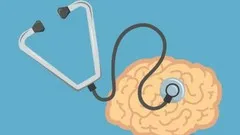
Fundamentals of Neuroscience Part 2: Neurons and Networks 
This course explores the fundamentals of neuroscience, focusing on neurons and networks. It examines how neurons communicate with each other and how complex dynamics can arise from simple interactions. It also looks at the structure and function of neurons, as well as the role of neurotransmitters in the transmission of signals. Finally, it covers the principles of neural networks and their applications. ▼
ADVERTISEMENT
Course Feature
![]() Cost:
Cost:
Free
![]() Provider:
Provider:
Edx
![]() Certificate:
Certificate:
Paid Certification
![]() Language:
Language:
English
![]() Start Date:
Start Date:
17th May, 2023
Course Overview
❗The content presented here is sourced directly from Edx platform. For comprehensive course details, including enrollment information, simply click on the 'Go to class' link on our website.
Updated in [March 06th, 2023]
This course, Fundamentals of Neuroscience Part 2: Neurons and Networks, provides an exploration of the complexity of neurons and how they interact with one another. Through animations, documentaries, and virtual labs, students will gain an understanding of how neurons pass signals to one another and how complex dynamics can result from just a few neurons arranged in relatively simple circuits. Students will also learn how the brain modulates the signals in those networks.
[Applications]
It is suggested that those who have completed Fundamentals of Neuroscience Part 2: Neurons and Networks apply their knowledge by exploring animations that explore the richness and complexity of the brain, watching documentaries about working labs around Cambridge, and using virtual labs to simulate neuron circuitry to investigate the collective behavior of neurons and learn how the brain modulates the signals in those networks.
[Career Paths]
1. Neuroscientist: Neuroscientists study the structure and function of the nervous system, including the brain, spinal cord, and peripheral nerves. They use a variety of techniques, such as electrophysiology, imaging, and molecular biology, to understand how the nervous system works and how it is affected by disease. Neuroscientists are in high demand as the field of neuroscience continues to grow and develop.
2. Neuropsychologist: Neuropsychologists specialize in the study of the relationship between the brain and behavior. They use a variety of techniques, such as cognitive testing, to assess and diagnose neurological disorders. Neuropsychologists are increasingly in demand as the field of neuroscience continues to expand and develop.
3. Neurosurgeon: Neurosurgeons specialize in the diagnosis and treatment of diseases and disorders of the nervous system. They use a variety of techniques, such as surgery, to treat neurological disorders. Neurosurgeons are in high demand as the field of neuroscience continues to grow and develop.
4. Neuroengineer: Neuroengineers specialize in the design and development of medical devices and technologies for the diagnosis and treatment of neurological disorders. They use a variety of techniques, such as computer modeling and simulation, to develop new technologies for the diagnosis and treatment of neurological disorders. Neuroengineers are in high demand as the field of neuroscience continues to expand and develop.
[Education Paths]
1. Neuroscience Degree: A neuroscience degree is a great way to explore the complexities of the brain and nervous system. This degree typically covers topics such as neuroanatomy, neurophysiology, neurochemistry, and neuropsychology. It also covers topics such as cognitive neuroscience, neuroimaging, and computational neuroscience. With the increasing use of technology in neuroscience, this degree is becoming more popular and is expected to continue to grow in the coming years.
2. Cognitive Science Degree: Cognitive science is an interdisciplinary field that studies the mind and its processes. It combines elements from psychology, neuroscience, linguistics, philosophy, and computer science. A cognitive science degree focuses on understanding how the brain works and how it affects behavior. It also covers topics such as artificial intelligence, machine learning, and natural language processing. This degree is becoming increasingly popular as technology advances and is expected to continue to grow in the coming years.
3. Computer Science Degree: Computer science is a field that focuses on the design and development of computer systems and software. It covers topics such as algorithms, data structures, programming languages, and operating systems. With the increasing use of technology in neuroscience, a computer science degree is becoming more popular and is expected to continue to grow in the coming years.
4. Psychology Degree: Psychology is the scientific study of the mind and behavior. It covers topics such as cognition, emotion, motivation, and development. A psychology degree focuses on understanding how the brain works and how it affects behavior. It also covers topics such as clinical psychology, social psychology, and cognitive psychology. This degree is becoming increasingly popular as technology advances and is expected to continue to grow in the coming years.
Course Provider

Provider Edx's Stats at AZClass
Fundamentals of Neuroscience Part 2: Neurons and Networks explores the fundamentals of neuroscience with an emphasis on neurons and networks. It studies how neurons communicate with each other, and how simple interactions can generate complex dynamics. It also studies the structure and function of neurons and the role of neurotransmitters in signal transmission. Finally, the principles of neural networks and their applications are introduced. They will learn about neurons and how they interact to form complex networks. Through animations, documentaries, and virtual laboratories, learners will explore the richness and complexity of the brain and nervous system.
Discussion and Reviews
0.0 (Based on 0 reviews)
Explore Similar Online Courses

Beginner Figure Drawing - How to Draw Hands

CCNA OSPF troubleshooting: Cisco CCNA and ICND2 exam prep

Python for Informatics: Exploring Information

Social Network Analysis

Introduction to Systematic Review and Meta-Analysis

The Analytics Edge

DCO042 - Python For Informatics

Causal Diagrams: Draw Your Assumptions Before Your Conclusions

Whole genome sequencing of bacterial genomes - tools and applications

Control Your Subconscious Mind: Neuroscience Hidden Secrets

Perform an Excellent Neurological Bedside Exam


Start your review of Fundamentals of Neuroscience Part 2: Neurons and Networks